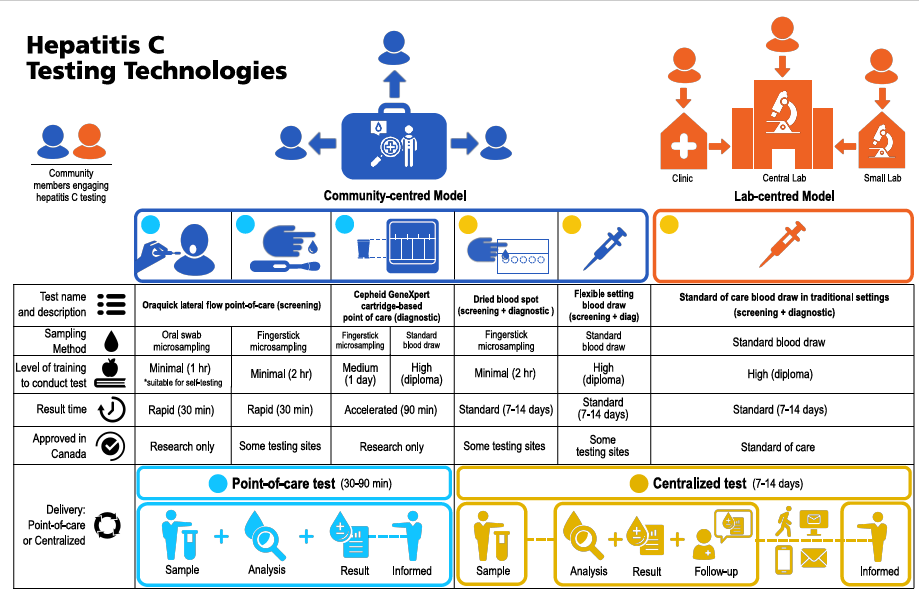As the project coordinator for the Hepatitis C Leadership Project, I wanted to learn more specifics about the various hepatitis C testing technologies. During a conversation focused on community knowledge-building with Dr. Sofia Bartlett from the BCCDC, it was recognized that creating a visual summary of hepatitis C testing technologies could be useful for community.
Dr. Bartlett provided the core information which then got converted into an initial draft. Then, some community members were engaged who provided valuable feedback leading to the final version of the resource.
This visual resource is intended for community educators, peer support workers, healthcare practitioners, or anyone who would like to learn more about hepatitis C testing technologies. Here is a preview of what the resource looks like. The full document can be downloaded as a PDF further down in this article.

Two key concepts come into play in the purpose and creation of this resource. Those being, health literacy and knowledge translation.
Health literacy
“Health literacy implies the achievement of a level of knowledge, personal skills and confidence to take action to improve personal and community health by changing personal lifestyles and living conditions. Thus, health literacy means more than being able to read pamphlets and make appointments. By improving people’s access to health information, and their capacity to use it effectively, health literacy is critical to empowerment.” – World Health Organization
Building individual and community health literacy is dependent on building knowledge and awareness as well as skills. Skills are the ability to apply knowledge and experience to particular situations. Health literacy emphasizes people’s ability to use health-related information instead of simply understanding it. When community-focused skills are put into practice it contributes to the larger purpose of creating community change.
Knowledge translation
Knowledge translation can be thought of as a process that converts knowledge and information that makes sense to one group of people into knowledge and information that makes sense to another. Knowledge translation supports health literacy because it encourages relatability and comprehension of information to the audience whose health literacy aims to be strengthened.
The process of translation takes place within a system of interactions between researchers, service providers, healthcare workers, peer groups, and people who access services to name a few. All of which, to some degree, might have their own body of hepatitis C knowledge and ways of speaking to it in terms of terminology, language, acronyms, usage and applications. Because of such differences between groups of people or disciplines, knowledge translation plays an important role.
Please use and share this resource. If you would like to print it onto paper it is best viewed in colour and requires 11”x17” paper.
![]() Click to download the Hepatitis C Testing Technologies Visual Resource
Click to download the Hepatitis C Testing Technologies Visual Resource
Do you recognize other hepatitis C learning resources needed in community to strengthen individual and community health literacy?
Email [email protected] or enter your learning resource idea in the form provided below.
Monte Strong, Hepatitis C Leadership Project Coordinator
Oops! We could not locate your form.
